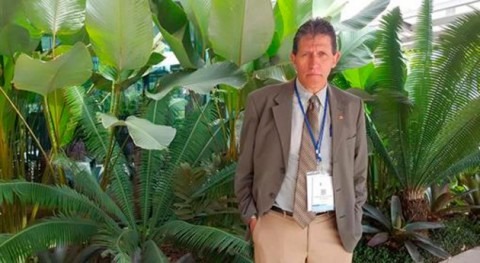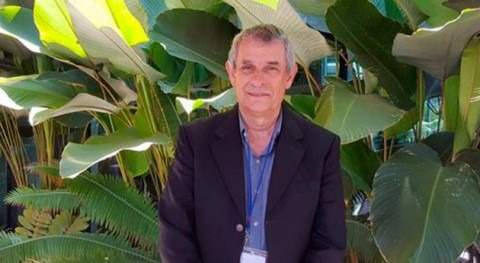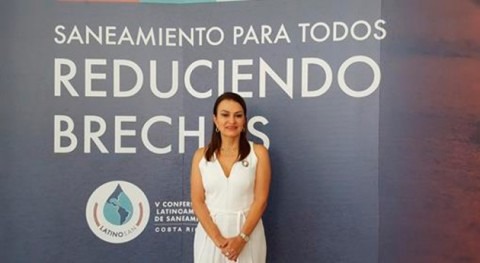Alfonso Alonzo, Minister of Environment and Natural Resources of Guatemala, is the president of the Conference of Ibero-American Water Directors (CODIA) since its 19th meeting in La Antigua, Guatemala, on November 5-8, 2018, until the 20th meeting, to be held in Dominican Republic in November 2019. We talk with him at length about the challenges of the Sustainable Development Goals, about inequality, creativity and the importance of strategic planning.
What are the challenges regarding the 2030 Sustainable Development Agenda in Guatemala?
We received a country with 47 waste water treatment plants, and currently we have 270 plants and 500 pre-feasibility studies. This has been possible thanks to a strategy and working closely together with mayors. An agreement from 2006 states that 'each municipal government should have at least one treatment plant' and we have invested funds from municipalities and the government to reach that target. We have also set water and sanitation as a priority, and so the congress allocated 16 million euros to waste water treatment plants. Before there was never money available for it.
How are you addressing the gap in sanitation between urban and rural areas?
In Guatemala, drinking water is under the responsibility of the Ministry of Health, and sanitation is under the Ministry of Environment. Sometimes those issues come together, when polluted water reaches rivers. We have worked with mayors on sewerage systems, to complete sanitation systems where waste water goes to a treatment plant. The problem is the high cost involved, and we had no funds. Also, the issue was not a political priority. Nowadays the issue is no longer a dream, the plants are being built. We need more than 2,000 million dollars, but I prefer to see the glass half full, and be positive about our achievements so far. Let us hope the next government shares the same vision.
What per cent of waste water undergoes treatment in Guatemala?
With the new plants, 25% of the waste water is treated, but it is also important to see what the industry is doing. We have pressed for them to have their own plants.
At the CODIA we have discussed the importance of water resource planning. Guatemala does not have a law that contemplates it, and it is extremely important for the country. We have to embark upon strategic planning. It is a must. Currently, at least we have short, medium and long term planning. We expect that in 15 years all waste water will be treated; at least we have started.
We have also set water and sanitation as a priority, and so the congress allocated 16 million euros to waste water treatment plants.
What is the role of the Conference of Ibero-American Water Directors (CODIA) in Guatemala?
The role is essentially a technical one. We think the CODIA brings together the experiences of other countries, and it helps us with the presentation of reports; it supports water directors to enable the application of the most recent trends. We think the role of the CODIA over the past 20 years has been very valuable, our goal is to strengthen its political role, so that it can have an influence on decision makers.
How would that be?
We have to ensure the issues are included in the agenda of ministers. We need to involve authorities at the highest level so they can make the decisions.
What type of experiences?
In Guatemala, for example, we have chosen to share our experience with barriers made of recycled material, known as 'biobardas' that we use to prevent floating solid waste from travelling down rivers and polluting the sea. The World Economic Forum referred to them at the end of 2018 as one of the most creative models in the world.
We had to do something with the material recycled and we started in Quetzalito, at the Motagua River mouth, and thanks to this technology we have avoided an international lawsuit. We are able to retain 65% of the waste. We have 160 biobardas in our country and we are supporting others in Honduras, Dominican Republic, El Salvador, and soon in Argentina. It is not a solution, but we are working on a comprehensive approach (solid waste treatment plants, waste water treatment plants, and specially environmental education to change the way people think). A country should not be collecting less garbage, but polluting less.
And what do you think about the proposed sewer to collect the waste water from the Atitlán lake basin?
All ideas are good, but sometimes we are afraid of changes, and more so when there is misinformation. Lake Atlitán has its own legislation, and for the past 20 years, sanitation has been a pending issue. The issue of the sewer has the support of the association 'Amigos del Lago'; they are promoting this alternate solution because nothing was being done and the situation was worrisome. We have been respectfully working with them; we are requesting a pre-feasibility study with the BCIE. We would like to know what is more feasible, the sewer or building treatment plants. I prefer the second option, because it is already part of a strategy with local authorities.
But how do you address the challenges?
These issues have to be addressed in an integrated manner, involving different institutions. The mayors had other interests, because the issue of waste water was not making them gain more votes: the sewer system is out of sight, and treatment plants more so.






